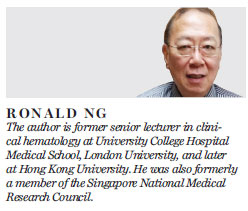HK needs new organ donation policy
Updated: 2015-10-19 09:15
By Ronald Ng(HK Edition)
|
|||||||
Ronald Ng argues that Hong Kong people need to change their attitudes toward organ donations and realize that by doing so they will be able to save more lives
The recent tragic death of 19-year-old Jamello Lo, who suffered from a rare disease that required a lung transplant, highlighted the plight of the many patients in Hong Kong who are on the waiting list for donations of suitable organs. Unless there is a dramatic shift in public attitude favoring voluntary donation or an "opt-out" policy is introduced soon, the vast majority of those on the waiting list are destined to suffer a low quality of life for an indefinite future that current medical knowledge cannot help alleviate short of an organ transplant.
Quite aside from the many myths that surround organ transplants, some of which are presumed to be associated with religious beliefs, there are other emotional reasons one must also consider. But it is notoriously difficult to use logic to counter deep-seated beliefs. These include the myth that people should be buried with all their organs intact.
The bodies of most people who die in Hong Kong are cremated. One can argue that since the body is cremated, all the organs in that body are burnt and no organs will remain intact anymore. That being the case, one should donate the organs to save others who need just such healthy organs. That is a logical argument which often cannot overcome sentimental and emotional attachments to the deceased, whose organs they cannot bear to give away to save lives, even after death.
The failure to donate organs for transplants really comes down to emotional issues. The common profile of someone whose organs are suitable to be transplanted is a previously healthy young adult who dies suddenly, either from an accident or from a cerebral vascular accident, or bleeding in the brain. Imagine the shock to the family of having a loved one, who a few moments ago was still in the pink of health, suddenly pass away. How many of them would be in the right emotional state of mind to think of the altruistic logic and medically sound arguments in support of an organ transplant?
In Singapore, prior to the enactment of the Human Organ Transplant Act in 1987, the way consent for organ donation was obtained was similar to that in Hong Kong. It was an opt-in system. Prior to 1987, the average number of kidney transplants done per year was around five. With the passage of the act, which initially exempted the Muslims, unless a person has deliberately filled in a form to opt-out of the program he is presumed to have given his consent to have his organs harvested for donation and to be transplanted. This is called the opt-out policy. After this law was passed, from 1987 to 2004 there was an average of 13 kidney transplants per year. It went up sharply to 45 each year from 2004 to 2012.
Lest anyone accuses Singapore of being authoritarian in disregarding people's wishes, I should add that prior to the enactment of the opt-out policy an extensive public consultation was conducted.
Initially, the Muslim population was excluded from that act. It was only in 2004, with clarification from the Muslim religious leaders that organ donation was not against the teaching of Islam, that Muslims were included in an amendment to the act. This is not surprising, as all major religions teach benevolence and the treasuring of life itself.
I would also like to point out that a number of Western nations, namely Spain, Austria and Belgium, have also adopted an opt-out policy, and their experience of the rate of organ harvesting for transplant similarly showed a rapid rise following the adoption of that policy.
Historically, even with the opt-out policy, there are two ways one could administer that policy. They are unofficially called the soft opt-out and the hard opt-out policies. In the soft opt-out policy, though the deceased is presumed to have given his consent for the harvesting of his organs, if he has not signed the opt-out form, his relatives are still consulted and their permission is still required. In the hard opt-out policy, the family members are not consulted. Singapore adopts the soft opt-out policy. That policy is more attuned to Asian sensibilities. Even with that policy, as can be seen from the statistics, there was a rapid rise in the number of transplant operations being carried out.
It is high time that an enlightened society like Hong Kong should rid itself of the shackles of superstitious beliefs and irrational personal attachments, and bring a new lease of life to those whose existence is in limbo for want of a donated organ. The opt-out policy speaks volumes of a community's compassion and love for one another, under a government which dares to introduce a policy that serves the neediest among us.

(HK Edition 10/19/2015 page7)